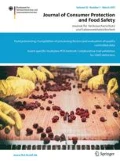Zusammenfassung:
Supplemente für Sportler, insbesondere ,,Muskelaufbaupräparate“, fanden bei bisher durchgeführten Erhebungen zum Konsumverhalten von Nahrungssupplementen nur wenig Beachtung. Im Hinblick auf eine effektive und zielgruppenorientierte Risikokommunikation sind Kenntnisse zum Konsumverhalten zu dieser Produktgruppe allerdings unerlässlich. Ziel der Erhebung war es daher, im Bereich der Sportlersupplemente Erwartungen der Verwender an derartige Produkte, ihren Informationsstand sowie die Verwendungshäufigkeit zu untersuchen.
Die Umfrage (n=145) wurde in Nordrhein-Westfalen mittels standardisierter Fragebögen anonymisiert durchgeführt. Als Einschlusskriterien für die Studienteilnahme wurden eine sportliche Aktivität ≥ 2 Trainingseinheiten/ Woche mit einer Dauer von jeweils ≥ 1 Stunde sowie die Mitgliedschaft in einem Fitnessstudio und / oder Sportverein festgelegt.
Von den befragten Sportlern verwendeten 76,6% spezielle Sportlersupplemente zum Muskelaufbau (ohne Vitamin- und Mineralstoffpräparate). Am häufigsten waren dies Proteinpräparate (69,7%) und Kreatin (39,3%). Der Erwerb der Supplemente erfolgte überwiegend in Fitnessstudios (34,8%); diesen kommt auch bei der Beschaffung von Informationen eine zentrale Bedeutung zu. So wurde überwiegend angegeben (22,2%), dass Informationen zu Sportlersupplementen vom ,,Trainer“ übermittelt werden.
Die Mehrzahl der Studienteilnehmer stellt lebensmitteltypische, nicht arzneiliche, Erwartungen an die Produkte. Interessanterweise geht die Mehrzahl der Befragten davon aus, dass die postulierten Wirkungen wissenschaftlich nicht gesichert sind.
Insgesamt weisen die Ergebnisse darauf hin, dass Verwender von Muskelaufbaupräparaten sich von den Nutzern anderer Supplemente unterscheiden. Entsprechend sollten hier spezielle Strategien der Risikokommunikation erwogen werden.
Abstract:
“Ergogenic aids” from consumers view – Results of a survey in Germany (North Rhine-Westphalia)
National surveys regarding consumer behaviour in the field of food supplements (FS) did recently not analyse the usage of sport supplements (SP) amongst sportsmen besides elite athletes.
Therefore, the aim of the study was to investigate the consumer behaviour and expectations concerning SP in a sample of 143 sportsmen recruited in North Rhine-Westphalia (Germany). The criteria for participation were regular physical activity and / or sports club membership. Data were obtained anonymous using standardized questionnaires; usage of vitamin and mineral supplements was not considered.
76.6% of all participants reported the actual use of SP. Most frequently reported was the use of protein supplements (69.7%) and creatine (39.3%). Gyms were preferred point of purchase (34.8%) and trainers were preferred source of information (22.2%) about SP.
The results of this study indicate that SP usage among sportsmen is widespread and shows similarities to results concerning the use of SP amongst elite athletes. Since trainers where reported as source of information and gyms where preferred point of purchase, it can be estimated that gyms are the linchpin of opinion formation about SP. Thus with regard to the number of gym members in Germany (5.5 million), the potential target group size of SP has to be reviewed.
The role of consumer behaviour and expectations concerning SP indicates the need of further research to enforce an effective risk communication model in this area.
Abbreviations
- BCAA:
-
branched chain amino acids (verzweigtkettige Aminosäuren)
- BfArM:
-
Bundesinstitut für Arzneimittel und Medizinprodukte
- BfR:
-
Bundesinstitut für Risikobewertung
- BGH:
-
Bundesgerichtshof
- BLE:
-
Bundesanstalt für Landwirtschaft und Ernährung
- CLA:
-
conjugated linoleic acid (konjugierte Linolsäuren)
- HCA:
-
Hydroxycitronensäure
- HMB:
-
ß-Hydroxy-ß-Methylbutyrat
- k.A.:
-
keine Angabe
- Mio.:
-
Millionen
- n:
-
Anzahl
- WADA:
-
Welt-Anti-Doping-Agentur.
Author information
Authors and Affiliations
Corresponding author
Additional information
Eingegangen: 6. Juni 2008; angenommen: 16. Juni 2008
Interessenkonflikt: Bei keinem der Autoren besteht ein Interessenkonflikt.
Rights and permissions
About this article
Cite this article
Winters, J., Nettekoven, S., Ritter, G. et al. „Muskelaufbaupräparate“ aus Konsumentensicht - Ergebnisse einer Verbraucherbefragung in Nordrhein-Westfalen. J. Verbr. Lebensm. 3, 380–384 (2008). https://doi.org/10.1007/s00003-008-0371-3
Published:
Issue Date:
DOI: https://doi.org/10.1007/s00003-008-0371-3

